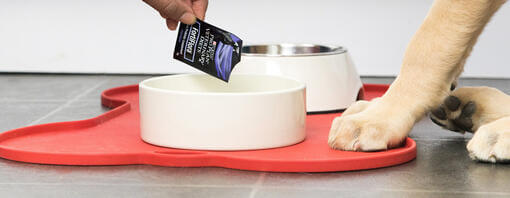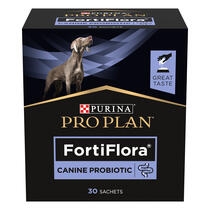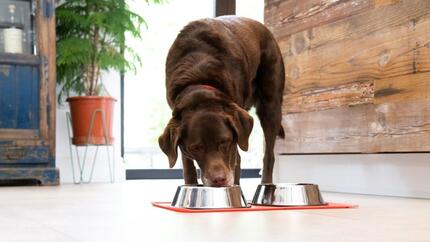

The healthy microbes in your dog’s digestive system have many important jobs to do, including absorbing and making nutrients and preventing illness by supporting the immune system. Stress, dietary changes or antibiotic use can disrupt that important microbial balance and lead to health problems including digestive upsets. This is where probiotics come in to help. Keep reading to find out more about probiotics, discover when they’re usually used and learn what are some of the best probiotics for dogs.
What are probiotics for dogs?
There are billions of ‘healthy’ microbes in your dog’s gut and these have important functions in food digestion, vitamin production and keeping the immune system strong. But sometimes the balance of microbes gets disrupted, and harmful bacteria proliferate at the expense of these good microorganisms. Probiotics for dogs are live microorganisms that can restore a healthy balance of gut microflora.
When to give your dog probiotics?
The signs of microbial imbalance in dogs include digestive problems such as loose stools (diarrhoea) or flatulence. Microbial imbalance can be caused by many different factors:
- Sudden changes in diet.
- Separation anxiety.
- Long-term antibiotic use.
- Stressful experiences such as moving into a new home.
These are some of the most common reasons why pet owners may start considering a course of probiotics for dogs. However, it’s important to consult your vet before adding a supplement of probiotics to your dog’s diet. There are a lot of probiotic preparations out there and not all of them are high-quality and backed up with evidence, but your vet will be able to advise on a good option for your dog.
What are the best probiotics for dogs?
If your vet believes probiotics will be beneficial to your dog’s health, there are different options available. Probiotics for dogs come in various formulations:
- Tablets
- Chews
- Food spray
- Powder (such as Purina PRO PLAN FORTIFLORA)
It’s important to follow the product instructions as well as your vet’s recommendations when it comes to quantities and how frequently to offer probiotics to your pet.
Purina PRO PLAN Canine FORTIFLORA Probiotics for Dogs
If you’re looking for a convenient way to offer your dog probiotics, Purina PRO PLAN Canine FORTIFLORA comes in sachets of powder that can be easily sprinkled onto your dog’s food once a day. This food supplement has been designed for both adult dogs and puppies and it contains the lactic acid bacteria Enterococcus faecium to help support intestinal health and microflora balance. You can find out more about our probiotic for dogs, here.
As with any probiotic, make sure you ask your vet before adding it to your dog’s diet.
Can puppies take probiotics?
Yes, vets will sometimes recommend puppies take specially-formulated probiotics for dogs. These can be incredibly useful for young pups. The life of a puppy is full of new experiences and changes in diet and puppy anxiety can result in loose stools or other digestive problems. It’s important to make diet changes gradually, but sometimes even with the best will in the world digestive problems can result. This is where probiotics can come in handy. Again, make sure you check with your vet before introducing probiotics, as there are many possible reasons for tummy upsets in puppies and it’s important to rule serious issues out if your pup is unwell.
Is yoghurt a good probiotic for dogs?
Yoghurt is well-known for giving us humans the good gut bacteria we need. When it comes to dogs, yoghurt is a bit more controversial as an option for probiotic benefits, as dogs have different digestive systems to humans. Yoghurt is not toxic to dogs and as long as you offer it in moderation and avoid the sweetened versions, most dogs should be able to enjoy it every once in a while. However, yoghurt contains lactose which may cause digestive problems in some dogs, so it is important only to offer a small amount to start with and stop if there are any problems.
Lastly, it’s always a good idea to read the label and look out for ingredients that may be toxic to dogs, such as xylitol, and avoid these products entirely for your pet.
Find out more about the most common digestive problems in dogs with our easy guide, next.
Discover PRO PLAN Fortiflora
Related articles









